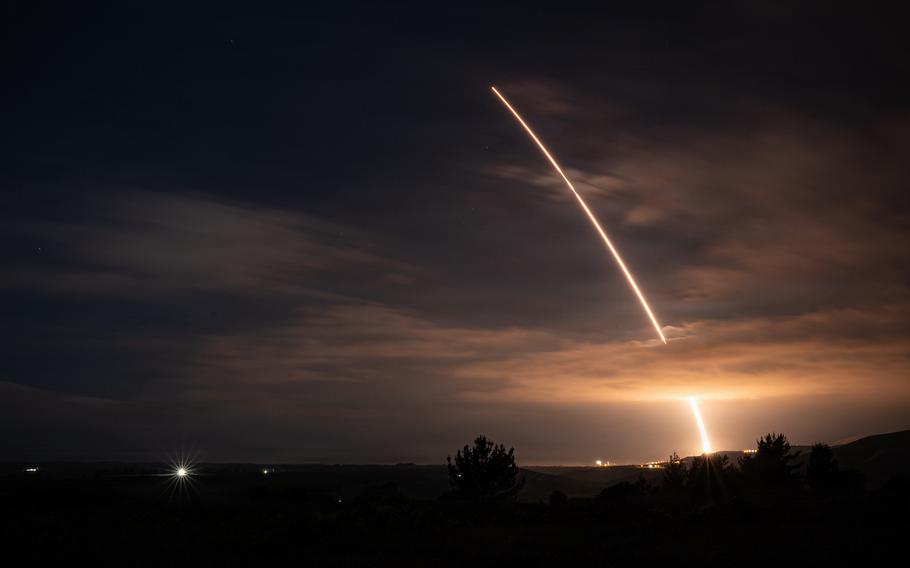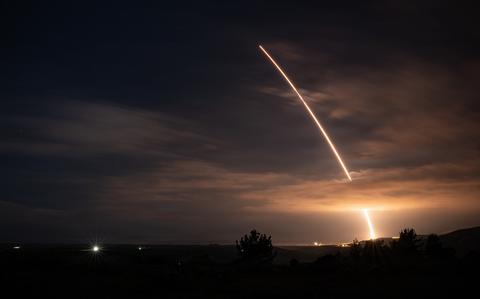
An unarmed Minuteman III ballistic missile is launched from Vandenberg Space Base on Wednesday, Nov. 5, 2025. U.S. Air Force Global Strike Command said the missile flew 4,200 miles southwest across the Pacific to a test site at Kwajalein Atoll in the eastern Pacific Ocean. (Draeke Layman/U.S. Space Force)
WASHINGTON — Democratic senators representing states that bore the brunt of the fallout from explosive nuclear weapons testing are seeking to pass legislation that would bar President Donald Trump from unilaterally resuming such tests.
Their introduced bill, the No Nuclear Testing Without Approval Act, is a response to Trump’s announcement last week that he had ordered the Pentagon to restart the testing of nuclear weapons, citing the nuclear arsenals of Russia and China.
It is still unclear if Trump was referring to the testing of nuclear-capable weapons delivery platforms, which the U.S. conducted on Wednesday with the routine launch of a Minuteman III intercontinental ballistic missile, or the nuclear explosive testing the U.S. last conducted in 1992.
But lawmakers from states that were exposed to the radioactive fallout from atmospheric and underground nuclear weapons testing during the Cold War said they wanted to make sure Trump would be unable to act without congressional approval.
“Nevadans were blindsided when President Trump said he could revive the outdated, misguided practice of detonating nuclear weapons,” said Sen. Catherine Cortez Masto, D-Nev. “No administration should have the authority to set off nuclear bombs on American soil without any oversight or outreach to the states that would bear the burden of these dangerous tests.”
The legislation would require Trump, and future presidents, to show Congress proof that they have engaged with states in which the potential tests would be conducted. The only place the U.S. can conduct an explosive nuclear weapon test is at the Nevada National Security Site, according to senators.
The U.S. tested most of its nuclear weapons from 1945 to 1992 in Nevada and the Marshall Islands, with states such as New Mexico and Arizona suffering “downwind” contamination and health effects.
Sen. Mark Kelly, D-Ariz., warned that a resumption of nuclear testing could trigger a dangerous geopolitical chain reaction in which China and other nuclear powers would be prompted to also restart testing.
The only country known to have carried out explosive nuclear testing in recent decades is North Korea, in 2017.
The U.S., China and Russia remain signatories to the 1996 Comprehensive Nuclear-Test-Ban Treaty, which prohibited nuclear test explosions, though the U.S. and China never ratified the agreement and Russia rescinded its ratification in 2023.
Trump this week alleged that Russia and China have been secretly testing, and said the U.S. would follow suit.
“They test way underground where people don’t know exactly what’s happening with the test,” he said. “You feel a little bit of a vibration. They test and we don’t test. We have to test.”
China, which conducted its last known nuclear explosive test in 1996, denied the allegation on Monday.
Russian President Vladimir Putin on Wednesday said his country continues to abide by the moratorium negotiated in the 1990s but instructed agencies to submit proposals on how Russia could restart its own weapons testing.
“If the United States or other states party to the relevant treaty conduct such tests, then Russia will also have to take appropriate countermeasures,” he said.
Sen. Jacky Rosen, D-Nev., called Trump’s directive “reckless, unnecessary and dangerous” and said she moved to introduce legislation to involve Congress in a potential restart of testing because such a monumental decision “should not be made lightly or on a whim by an erratic president.”
Nevada Democrats Steven Horsford and Susie Lee are expected to introduce a companion bill in the House.
